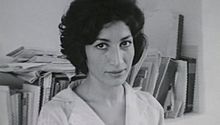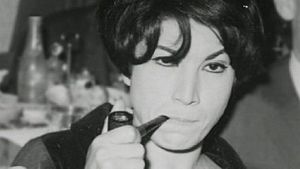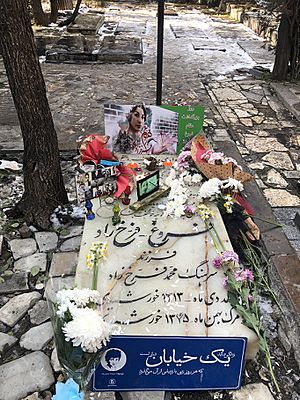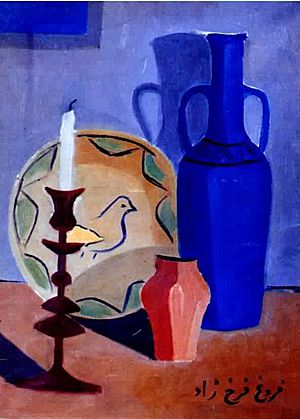Forugh Farrokhzad facts for kids
Quick facts for kids
Forugh Farrokhzad
|
|
|---|---|
 |
|
| Native name |
فروغ فرخزاد
|
| Born | Foroghzaman Farrokhzād Arraghi 28 December 1934 Tehran, Imperial Iran |
| Died | 13 February 1967 (aged 32) Tehran, Iran |
| Resting place | Zahir Dowleh Cemetery |
| Occupation | Poet, filmmaker |
| Nationality | Iranian |
| Notable works | The Captive (1955) Wall (1956) Rebellion (1958) Another Birth (1964) |
| Spouse |
Parviz Shapour
(m. 1952; div. 1955) |
| Partner | Ebrahim Golestan (1960–1967) |
| Children | Kamyar Hossein (adopted) |
| Relatives | Fereydoun Farrokhzad (brother) Pooran Farrokhzad (sister) |
Forugh Farrokhzad (Persian: فروغ فرخزاد; 28 December 1934 – 14 February 1967) was a very important Iranian poet and film director. She was known as a modern poet who often wrote about women's experiences. Farrokhzad sadly died young at 32 in a car accident.
Contents
Early Life and Creative Journey
Forugh Farrokhzad was born in Tehran, Iran, on December 28, 1934. Her father, Mohammad Bagher Farrokhzad, was a military officer. She was the fourth of seven children in her family.
Forugh went to school until ninth grade. She also learned painting and sewing at a special girls' school. At 16, she married Parviz Shapour, a writer. They moved to Ahvaz, and their son, Kamyar, was born a year later.
After her divorce in 1954, Forugh faced difficulties. She lost the right to raise her son, Kamyar. This was a great sadness for her. She often worried that her son might think she had left him on purpose.
In 1958, Forugh spent nine months traveling in Europe. When she came back to Iran, she met Ebrahim Golestan, a filmmaker and writer. He encouraged her to express herself and live independently. She published two more poetry books, The Wall and The Rebellion.
Forugh then traveled to Tabriz to make a film. It was about Iranians who had leprosy. This 1962 documentary, called The House is Black, is a very important film. It is part of the Iranian New Wave movement. While filming, she became very close to Hossein Mansouri, a child whose parents had leprosy. She adopted him and brought him to live with her mother.
In 1964, she published her book Reborn. Her poems from this time were very different from older Iranian poetry styles.
Women's Voices in Poetry
Forugh Farrokhzad's strong way of writing about women's feelings and thoughts often caused negative reactions. People sometimes disapproved of her work, both when she was alive and after she passed away.
In a radio interview, Forugh was asked about the "feminine perspective" in her poems. She replied that it was natural for her poems to have a feminine side because she was a woman. However, she believed that gender should not matter in art. She said that artists should focus on expressing themselves as human beings. She felt that if she only thought about writing as a woman, she would not grow as an artist. What matters, she said, is the quality of the work itself, not whether it was made by a man or a woman.
A Sudden End
Forugh Farrokhzad died in a car accident on February 14, 1967. She was only 32 years old. The official story is that she swerved her jeep to avoid a school bus. She was thrown from her car and hit her head. It was thought she died before reaching the hospital. However, some accounts say she died in the arms of Ebrahim Golestan.
Her poem "Let Us Believe in the Dawn of the Cold Season" was published after her death. Many people think it is one of the best modern poems in the Persian language.
Forugh Farrokhzad's Lasting Impact
After the Islamic Revolution in Iran, Forugh Farrokhzad's poetry was banned for over ten years. Many books and documentaries have been made about her life and work.
Nasser Saffarian directed three documentaries about her: The Mirror of the Soul (2000), The Green Cold (2003), and Summit of the Wave (2004). Sholeh Wolpé also wrote a short biography of Forugh in her book "Sin: Selected Poems of Forugh Farrokhzad" (2007).
In 2017, 50 years after Forugh's death, Ebrahim Golestan spoke about his relationship with her. He told The Guardian that he missed her greatly.
Sholeh Wolpé describes Forugh as Iran's most respected female poet. She says Forugh was a brave and talented poet. Her poems were a form of protest. They revealed the inner world of women, including their secrets, desires, and sorrows. Her poems are still important today for supporting women's freedom and independence.
Translations of Her Poetry
Forugh Farrokhzad's poems have been translated into many languages around the world. This shows how important and widely admired her work is.
Some of the languages her poems are available in include:
Films and Other Works About Forugh
Many creative works have been made about Forugh Farrokhzad. These include:
- Only Voice Remains - An English experimental documentary using Sholeh Wolpe's translations.
- I Shall Salute the Sun Once Again - An English documentary by Mansooreh Saboori (1998).
- Moon Sun Flower Game - A German documentary about Forugh's adopted son, Hossein Mansouri (2007).
- The Bride of Acacias - A play about Forugh by Ezzat Goushegir.
- Song of a captive bird - A novel about Forugh by Jasmin Darznik.
See also
 In Spanish: Forugh Farrojzad para niños
In Spanish: Forugh Farrojzad para niños
- Mina Assadi
- Simin Behbahani
- Parvin E'tesami
- Ebrahim Golestan
 | Ernest Everett Just |
 | Mary Jackson |
 | Emmett Chappelle |
 | Marie Maynard Daly |




